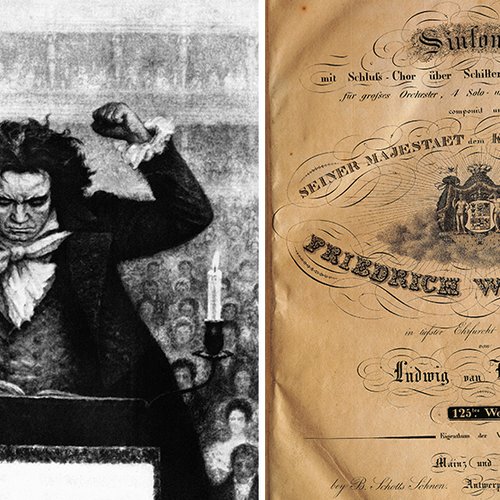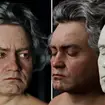Beethoven's history: 1803 - 1812
Part 2: Passion and Pain 1803 - 1812, during this period Beethoven premieres his First Symphony and meets some of the women who will have a major influence on his music.
1803 - First Symphony premiered
January: Beethoven appointed composer at the Theater an der Wien, moving into lodgings there with his brother Carl.
February to March: Beethoven composes the oratorio, Christus am Ölberge.
5 April: Beethoven's benefit concert in the Theater an der Wien. He premieres the Second Symphony and the Third Piano Concerto, playing the solo part himself. The First Symphony is also premiered.
24 May: Beethoven gives the first performance of the Violin Sonata op. 47, with the English virtuoso George Bridgetower as soloist. He dedicates the sonata to Bridgetower, but after Bridgetower makes an insulting remark about a lady, Beethoven withdraws the sonata from him and dedicates it instead to Rudolphe Kreutzer.
Summer Beethoven composes the Eroica Symphony in the village of Döbling, south of Vienna.
Beethoven composes 'Waldstein' Sonata, with Andante Grazioso as second movement.
1804 Meets Josephine Deym
Beethoven begins work on his opera, Leonore, with Sonnleithner as librettist.
April: Beethoven's contract at the Theater an der Wien is terminated, after Baron Braun buys the theatre.
20 May: Napoleon proclaimed Emperor of France. Beethoven tears up the title page of the Eroica bearing the dedication to him.
June: Beethoven moves into Stephan von Breuning's apartment, but the arrangement ends after a serious disagreement between them.
The Eroica Symphony is performed at Prince Lobkowitz's palace.
October: Beethoven becomes acquainted with Josephine Deym, née Brunsvik, who is recently widowed, and begins giving her piano lessons. He composes the song An die Hoffnung for her.
1805 'Appassionata'
Beethoven composes the Piano Sonata op. 57, 'Appassionata'. He completes composition of his opera, Leonore.
September: The censor bans the projected performance of Leonore at the Theater an der Wien. Ferdinand Ries leaves Vienna for Bonn to be conscripted into the French army.
5 October The censor lifts the ban on Leonore.
November: The French army occupies Vienna and Napoleon establishes his headquarters at Schönbrunn Palace.
20 November: First performance of Leonore.
2 December: Napoleon defeats the combined Austrian and Russian armies at the Battle of Austerlitz.
1806
Beethoven revises Leonore, with an altered text by Stephan von Breuning.
29 March Revised version of Leonore performed at the Theater an der Wien. But Beethoven withdraws his opera, accusing Baron Braun of cheating him of receipts.
25 May: Carl van Beethoven marries Johanna Reiss.
Beethoven works on the set of three String Quartets commissioned by Count Razumovsky and the Fourth Symphony.
17 July: Napoleon creates the Confederation of the Rhine.
August: Beethoven travels with Prince Lichnowsky to his country estate at Grätz, near Troppau, Silesia.
4 September: Beethoven's nephew Karl is born.
Count Oppersdorff, a near neighbour of Lichnowsky in Silesia, buys the Fourth Symphony. Beethoven begins work on the Fifth Symphony.
1807 Fifth Symphony
Feb 'Appassionata' Sonata published
April Muzio Clementi in London secures the rights to publish several works in Great Britain for the sum of £200.
13 September: Beethoven's Mass in C is performed at Prince Esterhazy's castle chapel in Eisenstadt.
Beethoven completes work on the Fifth Symphony.
1808 Benefit concert at the Theater an der Wien
March: Johann van Beethoven buys an apothecary shop in Linz.
27 March: Performance of Haydn's Creation in honour of the composer's seventy-sixth birthday.
April: Stephan von Breuning marries Julie Vering.
Summer: Beethoven composes the Pastoral Symphony while staying in Heiligenstadt.
10 August: Beethoven publishes Fourth Piano Concerto and Violin Concerto.
27 August: Ferdinand Ries arrives back in Vienna.
October: Beethoven is offered the post of Kapellmeister to King Jerome of Westphalia (Napoleon's younger brother) in Kassel, at a salary of 600 ducats.
22 December: Beethoven gives his much-postponed and long-awaited benefit concert at the Theater an der Wien, which sees the first performance of the Fifth and Pastoral Symphonies.
1809
7 January: Beethoven accepts the offer of Kapellmeister in Kassel. His friends begin drawing up an alternative contract to persuade him to stay in Vienna.
Beethoven begins work on the Fifth Piano Concerto, the 'Emperor'.
26 February: Archduke Rudolph, Prince Lobkowitz and Prince Kinsky agree to pay Beethoven an annuity for life on the sole condition that he remain in Vienna. He agrees, abandoning plans to go to Kassel.
9 April: Austria declares war on France.
4 May: Archduke Rudolph and other members of the Imperial family flee from Vienna in the face of the advancing French army. Beethoven composes the beginning of the Piano Sonata op. 81a, 'Les Adieux', for the Archduke.
10 May: French army surrounds Vienna. The next day they bombard and capture the city. During the shelling, Beethoven takes refuge in his brother Carl's cellar with Carl, his wife Johanna and son Karl, at one point covering his ears with pillows because of the harshness of the noise on his worsening hearing.
31 May: Joseph Haydn, Beethoven's former teacher, dies at the age of 77.
23 November: Beethoven agrees to set forty-three folksongs for the Scottish publisher, George Thomson.
1810
30 January: Archduke Rudolph returns to Vienna
13 February: Josephine Deym marries Baron von Stackelberg, her children's tutor.
1 April: Napoleon marries Marie Louise, daughter of Emperor Franz.
Beethoven becomes acquainted with the Malfatti family. He composes the Bagatelle WoO 59 for Therese Malfatti.
Dr Giovanni Malfatti becomes Beethoven's doctor.
July: The critic E.T.A. Hoffman's famous review of Beethoven's Fifth Symphony is published in the Allgemeine Musikalische Zeitung.
1811 An die Geliebte
15 March: Austria's currency is devalued fivefold under a Finanz-Patent, drastically reducing the amount Beethoven receives under his annuity.
Beethoven completes the 'Archduke' Trio.
28 May: Ignaz Gleichenstein, who has been acting as Beethoven's secretary, marries Anna Malfatti, Therese's sister, and they leave Vienna soon after for Freiburg.
Beethoven begins the Seventh Symphony.
During a long period of illness, Antonie Brentano is regularly visited by Beethoven, who plays the piano for her. He sets the poem An die Geliebte to music for her.
1812 Piano Trio WoO 39
Beethoven begins the Eighth Symphony.
24 June: Napoleon embarks on his invasion of Russia.
Beethoven composes the Piano Trio WoO 39 for Maximiliane Brentano.
29 June: Beethoven leaves Vienna for Prague on his way to Teplitz in northern Bohemia.
1 July: Beethoven arrives in Prague.
2 July: Beethoven sees Prince Kinsky concerning his annuity.
3 July: Franz and Antonie Brentano and their daughter Fanny arrive in Prague on their way to Karlsbad in northern Bohemia.
4 July: Beethoven leaves Prague for Teplitz.
5 July: Beethoven arrives at Teplitz in the early morning. The Brentanos arrive in Karlsbad.
6 July: Beethoven begins a passionate letter to an unnamed woman. In it he calls her his 'Eternally Beloved' [unsterbliche Geliebte].
July: Beethoven and Goethe meet several times.
25 July: Beethoven leaves Teplitz for Karlsbad to join the Brentano family.
Beethoven returns to Teplitz, where he meets Amalie Sebald. She looks after him when he falls ill.
Sept Beethoven makes a sudden decision to travel to Linz where his brother Johann has announced his intention to marry his housekeeper, Therese Obermayer. Beethoven is determined to stop the marriage, judging Therese - who has an illegitimate child - unsuitable for Johann.
October: Beethoven composes three equali for trombones for the Linz Kapellmeister Glöggl.
2/3 November: Prince Kinsky, one of the three signatories to Beethoven's annuity, dies after being thrown from his horse while hunting.
8 November: Johann van Beethoven marries Therese Obermayer.



























